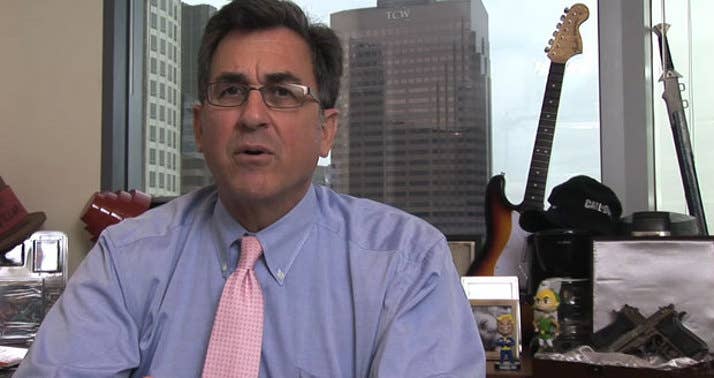How will 2018 shape the games business?
Our analyst panel dissects everything to look out for during the next year
As we all get ready this week for the holiday break ahead, it's hard not to think about the new year and how the games industry will continue to evolve. 2017 may have been a downright depressing year for many across the globe, but it was at least a fantastic year for games.
PUBG is driving plenty of excitement, Nintendo has come back in full force, Mario and Zelda are shining, and PlayStation 4 is selling almost as well as the PS2. Even the Xbox business is on the rise this holiday thanks to the new 4K-enabled One X and the lower-priced One S. On the AAA software side, Activision has proved that Call of Duty is nowhere near dead, having one of its best years since Black Ops II, Ubisoft has breathed new life into Assassin's Creed with Origins, and Take-Two continues to hone its business while investing in high-end indies.
So what should we expect in the next 12 months? Can VR and esports show mainstream potential? Will Nintendo maintain its new Wii-like momentum? Will there be any new hardware announcements? No one knows for sure, but industry analysts always enjoy providing their forecasts and prognostications, so we've assembled our usual annual analyst panel to offer up some 2018 predictions and (in some cases) to evaluate their statements from the last year. Below you'll find predictions from SuperData's Joost van Dreunen, NPD's Mat Piscatella, IHS Markit's Piers Harding-Rolls, Wedbush Securities' Michael Pachter, and Kantan Games' Dr. Serkan Toto.
Joost van Dreunen, SuperData

Last year I said:
Mobile gaming will reach $40 billion in worldwide revenues. Looks like $40B was conservative as mobile gaming is totaling $60B for 2017. The expectation that legacy publishers would figure out and lead this market, however, didn't quite happen, mostly because of a surge in innovation coming from Asia.
Esports will undergo a real stress-test to become a media market as ad budgets grow... Activision Blizzard and Tencent (Riot Games) will generate around $200 million each from selling broadcasting rights. In spite of the hype this year, the development of esports into a revenue-based business is taking longer than expected. Both Activision and Riot did manage to make about the amounts I predicted.
VR finds its killer app. If 2016 is the year that consumer-ready VR was born, then 2017 will be the year that it starts teething. Large publishers have mostly stayed away from VR but with 2M units for the PSVR the category did grow steadily over 2017.
Activision will make $100 million in ad revenue... Activision is currently experimenting with some of King Digital's minor titles and will roll this out further mid-2017. This one holds but needs more time. King's retooling of its title inventory is taking the long way around.
Overall my predictions were in the right ballpark in terms of amounts and companies. But perhaps my enthusiasm for some of these changes led me to expect a shorter timeline than what happened in 2017.
This year:
Amazon buys GameStop - With console hardware starting to slow and VR unlikely to replace gaming as a product category in the short-term, the specialty retailer will be forced to reduce its footprint. The 6,100 retail outlets worldwide will play an important part in Amazon's ability to deliver gaming and consumer electronics worldwide.
"Ubisoft will sell off a piece to (1) ensure sustained creative freedom and (2) build on its recent successes"
Ubisoft sells off a minority share to a large Asian game company - Because consolidation continues to be the dominant trend in the European media landscape throughout 2018, Vivendi won't go away even if they've recently relented a bit on pursuing Ubisoft. The French publisher has other plans, however, and will sell off a piece to (1) ensure sustained creative freedom and (2) build on its recent successes.
Publicly traded firms are forced to become more transparent - On the wings of loot box drama and regulatory changes in early 2018, publishers will be forced to change their reporting standards (broader write-up here)
Esports has its do-or-die moment - After a solid 18 months of hype and easy money from investments, several stakeholders are on the hook to deliver. Activision's success with its Overwatch League will be regarded as a bellwether for the entire industry (even if that doesn't make a lot of sense because CS:GO and other titles are more organically grown than deliberately produced like Overwatch). With the eyes of the world on it, competitive gaming will be sluggish out the gate as a reconciliation sweeps the category (I've been throwing cold water on expectations for a while now). Recovery follows after uninformed investors exit the space and allow esports to grow on its own strength (building a great user-focused experience), creating value for advertisers and platforms.
Share of ad dollars as part of publisher revenue continues to grow - With the top of the digital charts dominated by a shrinking number of top firms, the industry's middle class turns to advertising to pay its rent. Second-tier publishers will rely on ads for about 15%-20% of annual revenue, compared to 70%+ for smaller outfits.
VR companies continue to shift focus away from games to enterprise applications - In the absence of a killer app (which I predicted last year would happen but didn't) and a clear consumer monetization path, dev studios take their expertise to other industries and pursue a B2B strategy.
Apple introduces game subscriptions - Maybe this is more of a want, but it seems to me that Apple can do a much better job connecting consumers to content by creating dedicated subscriptions. Facebook already created its own messenger for minors, so it stands to reason that Apple will follow suit with, for instance, a buffet-style subscription for kids games. I, for one, would gladly pay $10/month to not have my kid be exposed to all those low quality games that only exist because of ad revenue.
Big publishers become better at digital retail - Where previously game companies had relied on retailers to complete the final transaction, the growing success of digital sales has incentivized especially big firms to become better at this part of the process themselves. Specifically, to continue to drive their margins up, game companies will invest in staff and technology that will help activities traditionally handled by retailers, including price differentiation, inventory management, and in-app purchase optimization.
Mat Piscatella, The NPD Group

The coming year will be more evolutionary than revolutionary as the industry continues to shift from a product model to a live service one.
Growth in subscription services - Exponential revenue growth in this area is something I expect to see in 2018. I expect EA Access to make its way to the PlayStation 4, the launch of Nintendo's online service to be warmly received, services like Xbox Game Pass to expand and be promoted heavily, and the launch of new subscription services throughout the year. Combined with other existing services like PlayStation Plus and Xbox Live Gold, subscription services will be a significant growth area in the year.
Switch to lead the console market - Nintendo Switch exceeded the expectations of many in both quality and quantity of released content as well as sales in 2017. I expect this momentum to carry over into 2018 and Switch to both sell the most hardware units as well as generate the most software revenues at retail over the coming year. Pokemon RPG for Switch is the true wild card. If Pokemon RPG for Switch releases in 2018, we could start seeing multiple Switch units per household, raising the potential ceiling on traditional console benchmarks. Even without that, however, Switch is poised to take market leadership as PlayStation 4 and Xbox One enter their 6th years in market.
"The Switch will be challenged to make discovering those games easier for consumers and to ensure quality content doesn't get buried in the avalanche of releases"
Switch gold rush leads to discovery challenges - Nintendo Switch has been a fantastic success story of 2017, but with that success comes new challenges. One is the games storefront. Games are coming to Switch at a furious pace that will only increase over time. The Switch will be challenged to make discovering those games easier for consumers and to ensure quality content doesn't get buried in the avalanche of releases. While it's a long way from facing the same scale of challenges Steam is in this regard, Switch must connect consumers to the eShop content they'd enjoy buying and playing.
Immersive gaming VR will continue to struggle - The barriers to entry for mass market consumers to enter the high-end, immersive gaming VR space continues to be excessively high. From play pattern to price point to having necessary space available, immersive gaming VR will fail to exit its canyon of despair in 2018. Prices for hardware will continue to fall, but sales lifts will fail to follow. Game sales will continue to lag and goalposts for success will continue to shift. VR has an exciting present in mobile, and a bright future in many other use cases. Perhaps one day it will find success in immersive gaming. 2018, however, will not be that year.
Finally, I expect 2018 to be a bridge year for PlayStation 4 and Xbox One as a lead in to 2019 new console announcements for launch in 2020. After struggling for some time in the early part of the decade, and after facing significant declines in release and publisher count over that time, the console industry has since rebounded. I expect 2018 to follow the path set by a successful 2017.
Piers Harding-Rolls, IHS Markit

Last Year's Predictions:
Games market would reach $100 billion in consumer spending in 2017 - Partially right. Actually when we completed our actuals for 2016 after this piece was published we'd already broken this level ($102.9bn).
PS4 and Xbox One global sell-through of 27 million in 2017 - Unknown at present. Our current end of year forecast is an adjusted 26 million for these two consoles combined.
Switch sell-through of around 4.4 million for 2017 - Wrong. Switch has well outperformed both mine (and, to be fair, Nintendo's) pre-launch expectations. We upgraded our Switch forecast to 9.8 million for 2017 shortly after the strong launch. Our estimate currently sits at 11.7 million as of October.
Sign of a new Nintendo handheld - Partially right. We've had the 2DS remodel, which has elongated the lifecycle of the 3DS platform, but no news on a next-gen follow up.
Microsoft might miss its end of 2017 launch window for Xbox One X and launch at a price point significantly higher than PS4 Pro - Partially right. As we know Xbox One X didn't miss its launch window but was priced at a significant premium to PS4 Pro.
Negative sentiment around VR to increase - Right. The number of 'trough of disillusionment' stories has increased significantly in 2017.
No major standalone VR headset launches outside of China in 2017 - Right. HTC's Vive Focus is available for pre-order in China only and Oculus Go is not available yet.
This year:
Further growth to come - When the final tallies are pulled together early next year, IHS Markit is predicting world consumer spending on games to have broken $110 billion in 2017, with mobile games apps driving the most growth. In 2018, I expect the sector to deliver further growth of 8% propelling it to the $120 billion mark. Our outlook currently predicts that mobile games apps spending will break 50% share of the games market in 2018. Its share in 2008 was just 7%.
"Combined sales of Xbox One and PS4 consoles are predicted to be a little less than 24m in 2018, with Sony outselling Microsoft by over two times"
China is already the biggest games market and growing fast, much of this down to mobile spending. In China, mobile gaming is expected to overtake PC gaming as the biggest platform in 2017. In 2018, we forecast the China games market to break through the $30 billion level.
Sony, Microsoft, Nintendo in 2018 - I expect 2017 to be the peak year of PS4 hardware sales and for there to be a decline in 2018. At present, I do not expect the launch of the Xbox One X to narrow the gap in market share between Microsoft and Sony. Combined sales of Xbox One and PS4 consoles are predicted to be a little less than 24m in 2018, with Sony outselling Microsoft by over two times.
Currently, I do not expect Nintendo's Switch to outsell PS4 next year, although it is not out of the question. Much will depend on the Switch release pipeline, availability of content which resonates with a wide audience and bundling or pricing strategies in the second half of 2018. I also expect Switch to launch in China in 2018.
Last year our outlook predicted that in 2018, a majority of games content spend on all consoles would be digital (excluding subscriptions). It will be very close in 2018, but we now expect 2019 to be the inflection point where digital becomes the main distribution channel for console content. Outlook has been altered somewhat by the strength of the less digitally-enabled Switch.
Loot box controversy, Battle Royale overkill, Switch's gold rush, Tencent's overseas ambition, AR content growth - In 2018 I think it's inevitable that loot box use in console games will continue to stir controversy, especially as publishers shift their releases across to the games-as-a-service model already dominant in PC and mobile gaming.
I think it's also inevitable that although loot boxes are not considered gambling, the unlicensed gambling of virtual items and currency with the ability to cash out the winnings will confuse assessment of their impact and use. As a result, I expect a big clampdown on sites that promote virtual item or skin gambling.
2018 is the year that we'll hit saturation point for Battle Royale modes and titles. This is particularly true in China. Tencent has at least seven BR titles launched, licensed or in development, and I think it's likely some of these won't make it to market.
2017 was characterised by the opportunistic porting of content to Nintendo Switch as publishers and indie developers alike sought to take advantage of a hungry audience and limited competition. The window of opportunity is rapidly closing - 57 and 55 releases in November and December respectively suggests a much more competitive platform heading into 2018.
I predict that 2018 will be the year we see a much more expansionist strategy from China's leading publishers. Tencent and NetEase are starting to globalise their mobile games output and that will escalate next year. Further investments and acquisitions of Western games companies are also on the cards.
Lastly, I expect there to be solid growth in augmented reality apps spend in 2018. The arrival of Apple's ARKit and Google's ARCore and the 2018 follow up to Pokemon Go - Harry Potter: Wizards Unite - should push AR apps (including games) spend over $2 billion in 2018.
Outside bets for 2018 - Steam to be banned in mainland China; Tencent to expand WeGame PC game distribution platform to markets outside China; one or more governments (outside of China) to decide that self-regulation of loot boxes/microtransactions is not working and intervene; PUBG to be the big esports story of 2018, not The Overwatch League.
Michael Pachter, Wedbush Securities

Last year's report card:
PS4 to $199 before year-end (A+, happened over Black Friday weekend); No Rockstar games other than RDR2 (A+); CoD returns to glory with MW title from Sledgehammer (B-the title is WWII, but my "prediction" was that it would NOT be Advanced Warfare, and that Activision would endeavor to get fans back into the fold); Super Mario Run to flop (A+, Nintendo made a strategic error with Free to Start and the game flopped); Pokemon Go drops out of top 10 in every country with a population over 20 million (D, the game is top 10 in a handful of large countries still-I'm surprised at its staying power); the Switch is sold out through September (A-, supply showed up the last week of September); Xbox Scorpio priced at $399 (F, price was $499); the next Elder Scrolls installment comes out (F); the next Half Life does not (A).
This year:
Xbox One X price cut to $349 before year end - The box is popular among hardcore Xbox fans looking to upgrade, but is a tough sell with the PS4 having been discounted to $199 at holiday.
No new hardware from Sony, Nintendo or Microsoft - We have all the new devices we need, and other than perhaps a Switch with Joy Cons built in, I don't see any further iterations of existing hardware.
"Fortnite grew phenomenally when Battle Royale was added, and I think that Treyarch will add a Battle Royale mode to [Call of Duty] as part of the multiplayer next year"
A dramatic price cut on PSVR - Oculus at $349 is putting pressure on Sony to do something on the pricing, and I expect some kind of PSVR bundle with PS4 Pro at $599 or less.
I'm never giving up on Elder Scrolls - Bethesda surprised us with games at E3 in 2017, I expect them to do so again at the next E3.
Battle Royale mode in next year's Call of Duty - Similar to what they're rolling out in the Chinese free-to-play game, but offered on console in the West. PUBG popularized the deathmatch, Fortnite grew phenomenally when Battle Royale was added, and I think that Treyarch will add a Battle Royale mode to the game as part of the multiplayer next year.
Switch sales of under 20 million - I think rumors of 25 - 30 million units annually are crazy talk, unless somehow Nintendo achieves success in China. My bias is no more than 15 million units sold in the West, with any upside to that figure in China.
A mobile Warcraft game - Blizzard has purportedly been working on this for over three years, and notwithstanding that nothing has yet been formally announced, I think we'll see the game by sometime mid-year.
Continued flops from Nintendo's mobile effort - They don't seem to know how to build in-game purchases into their core franchises, and I don't see them making much progress with Animal Crossing. Whatever is next is likely to underwhelm.
No new BIG game announcements from Rockstar - RDR2 will have been in development for EIGHT YEARS by the time it comes out. I don't expect an announcement of any new games in 2018 except for Midnight Club (good, but not a BIG game), and don't think we'll see that until 2019 (which will have taken TEN YEARS to develop).
Dr. Serkan Toto, Kantan Games

2018 will be another successful year for Nintendo - I think while 2017 has been called a turnaround year for Nintendo, 2018 will work even better for them.
The Switch will be 2018's best-selling console, through increased support by triple-A developers and indies, a virtual console-like offering, the online service, and remakes of older titles (Mario Maker, for instance).
I would also not be surprised to see Nintendo bringing back a lot of the Wii classics to the Switch (which I think would make a lot of sense).
On mobile, 2017 has been slower than I predicted last year for Nintendo, but I think this might change in 2018. The company hasn't even scratched the surface of what's possible for it on smartphones.
I also predict a market entry for Nintendo in China in 2018, at the very least on mobile and through a partnership with Tencent (who else).
"I was very pessimistic about VR for the mass market in 2017, and I believe VR will not break through in 2018 either"
Microsoft will continue to struggle - Same as last year: I like the Xbox One, but I think Microsoft will continue to have a very difficult time against Sony. The PS4 simply has too many exclusive games slated for 2018, and there is no way big M can cover a lot of lost ground with the Xbox One X.
Apart from that, the first information or leaks could arrive next year regarding Sony and Microsoft's next-generation consoles.
VR and AR - I was very pessimistic about VR for the mass market in 2017, and I believe VR will not break through in 2018 either. Sony will surely come up with a new PSVR headset, there will be price cuts and maybe some new hardware for the Xbox One - but VR needs more time.
About AR (in gaming), I am similarly pessimistic. I understand the tech is getting better, but AR in general has been here for years now: where is the great content? Will it be Niantic's Harry Potter game?
Sequels, sequels, sequels - This may sound like a cheap one, as many sequels have already been announced to roll out in 2018, but my point is that we will see even more announced in the future. Development and marketing costs on console are going through the roof, and I don't see many triple-A studios willing to experiment in 2018.
So I would not only expect more sequels but also more remakes, remasters and games-as-a-service offerings in 2018.
Further consolidation on mobile - 2017 was a year of consolidation in mobile gaming, and I have no doubt the trend will continue in 2018. We will certainly see more studios dying or joining forces, the general quality of mobile games going up and perhaps the one or other surprise arriving on smartphones. (i.e. from Nintendo).
It would be about time: after all, mobile mega hits like Candy Crush, Clash Of Clans or Japan's Puzzle & Dragons will all celebrate their sixth anniversary in 2018.
Also, it's safe to expect more M&A activity in the mobile game space in 2018, especially driven by Korean and Chinese companies wanting to expand to the West and Japan.
